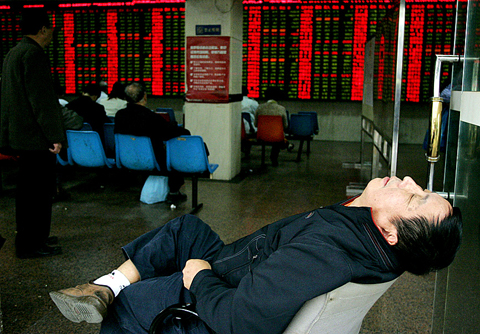Asian stock markets tumbled yesterday, following Wall Street lower as US presidential election euphoria gave way to worries about the global economy and company profits.
Japan’s Nikkei stock average retreated 6.5 percent to 8,899.14, and Hong Kong’s Hang Seng Index lost 7.5 percent to 13,727.50.
South Korea’s benchmark Kospi index broke a five-session winning streak to dive 7.6 percent.

PHOTO: AP
China’s Shanghai Composite Index closed down 2.44 percent and Australia’s S&P/ASX200 index closed 4.3 percent lower.
Markets in Singapore, Taiwan and Indonesia also dropped sharply.
European stocks followed Asia into sharp declines yesterday and oil extended losses as weak US data intensified fears about the impact of recession in major economies hit by the worst financial crisis in 80 years.
AGREEMENT
In South Korea, stock market agencies yesterday announced an agreement to set up a 515 billion won (US$390 million) fund to stabilize the volatile bourse.
The fund will buy 100 billion won worth of shares every month on the local bourse over the next five months.
Agreement was reached between the Korea Securities Dealers Association (KSDA), the market operator Korea Exchange, the Korea Securities Depository and the Asset Management Association of Korea, the KSDA said in a statement.
In European trading, the euro and sterling fell against the dollar as investors braced for the European Central Bank and the Bank of England to cut interest rates by at least half a percentage point.
Russia’s largest stock exchange MICEX halted trading of stocks for one hour after stock prices fell sharply.
The pullback in global equities was in line with weakness on Wall Street, where investor optimism surrounding the election of Democrat Barack Obama as president on Wednesday quickly evaporated in the face of gloomy economic news.
The US service sector, the largest component of America’s GDP, contracted sharply last month as new orders and employment took a tumble.
“We had one week of a rebound and then we’re coming back to reality,” said Francis Lun (藺常念), general manager of Fulbright Securities (富昌證券) in Hong Kong.
“Despite the euphoria over the election, the world’s economy hasn’t changed,” Lun said.
VOLATILITY
In New York on Wednesday, volatility swept over the US market again, with the Dow Jones industrial average falling 486.01, or 5.1 percent, to 9,139.27.
The S&P 500 index and the NASDAQ composite also shed more than 5 percent each.
“We’re back to the grim reality of economic data showing recessionary conditions and lower earnings guidance,” said Bernard McAlinden, investment strategist at NCB Stockbrokers.
“The counterbalance is interest rate cuts. We’re no longer in a situation where big cuts would cause panic,” he said.
Also See: British bank slashes rates

Authorities have detained three former Taiwan Semiconductor Manufacturing Co (TMSC, 台積電) employees on suspicion of compromising classified technology used in making 2-nanometer chips, the Taiwan High Prosecutors’ Office said yesterday. Prosecutors are holding a former TSMC engineer surnamed Chen (陳) and two recently sacked TSMC engineers, including one person surnamed Wu (吳) in detention with restricted communication, following an investigation launched on July 25, a statement said. The announcement came a day after Nikkei Asia reported on the technology theft in an exclusive story, saying TSMC had fired two workers for contravening data rules on advanced chipmaking technology. Two-nanometer wafers are the most

Tsunami waves were possible in three areas of Kamchatka in Russia’s Far East, the Russian Ministry for Emergency Services said yesterday after a magnitude 7.0 earthquake hit the nearby Kuril Islands. “The expected wave heights are low, but you must still move away from the shore,” the ministry said on the Telegram messaging app, after the latest seismic activity in the area. However, the Pacific Tsunami Warning System in Hawaii said there was no tsunami warning after the quake. The Russian tsunami alert was later canceled. Overnight, the Krasheninnikov volcano in Kamchatka erupted for the first time in 600 years, Russia’s RIA

South Korea yesterday said that it was removing loudspeakers used to blare K-pop and news reports to North Korea, as the new administration in Seoul tries to ease tensions with its bellicose neighbor. The nations, still technically at war, had already halted propaganda broadcasts along the demilitarized zone, Seoul’s military said in June after the election of South Korean President Lee Jae-myung. It said in June that Pyongyang stopped transmitting bizarre, unsettling noises along the border that had become a major nuisance for South Korean residents, a day after South Korea’s loudspeakers fell silent. “Starting today, the military has begun removing the loudspeakers,”

CHINA’s BULLYING: The former British prime minister said that he believes ‘Taiwan can and will’ protect its freedom and democracy, as its people are lovers of liberty Former British prime minister Boris Johnson yesterday said Western nations should have the courage to stand with and deepen their economic partnerships with Taiwan in the face of China’s intensified pressure. He made the remarks at the ninth Ketagalan Forum: 2025 Indo-Pacific Security Dialogue hosted by the Ministry of Foreign Affairs and the Prospect Foundation in Taipei. Johnson, who is visiting Taiwan for the first time, said he had seen Taiwan’s coastline on a screen on his indoor bicycle, but wanted to learn more about the nation, including its artificial intelligence (AI) development, the key technology of the 21st century. Calling himself an